U.S. Economy Operating at Stall Speed, Recession in Our Future?
Economics / Double Dip Recession Jul 31, 2011 - 03:52 AM GMTBy: John_Mauldin
 The GDP numbers for the second quarter came in, and there is no way to spin them as anything but ugly. And the revisions were worse. We simply have to take a few pages to look at them. And, as I noted last Monday in the Outside the Box, I met with some ten Senators Monday afternoon (as well as Congressmen in the morning), plus a lot of staff. Getting ten Senators in a room for 90-plus minutes is not so often done. I will report in this week's letter about our conversation and my impressions.
The GDP numbers for the second quarter came in, and there is no way to spin them as anything but ugly. And the revisions were worse. We simply have to take a few pages to look at them. And, as I noted last Monday in the Outside the Box, I met with some ten Senators Monday afternoon (as well as Congressmen in the morning), plus a lot of staff. Getting ten Senators in a room for 90-plus minutes is not so often done. I will report in this week's letter about our conversation and my impressions.
But first, I was in Vancouver for a few days this week at the Agora conference. I had dinner with old friends Bill Bonner, Barry Ritholtz, David Tice, Frank Holmes, and Keith Fitzgerald. I had spoken that morning and my speech was well-received, getting a fair complement of laughs. I was somewhat on a roll. I mentioned that I think a lot of the better financial speakers are actually frustrated stand-up comics, and there was general agreement on that.
I say that to set up the next item. This past April I spoke at my own investment conference in La Jolla (co-sponsored with Altegris Investments). It was a brand new speech, and I did something I have not done in years: I actually practiced it several times, as I did not want to embarrass myself, given the quality of the other speakers. I came off the stage feeling that I had given the worst speech of my career. The room was absolutely silent. I normally get a lot of laughs. I was getting no reaction at all. As I made my way to the rear of the room I was actually quite depressed.
Then several people (people who cut me no slack) told me that it was the best speech they had ever heard me give. I was surprised and said, "But the audience was so quiet. How come?"
"John, you just walked them through a scenario that was so compelling and so fraught with regard to our problematic future that it was very sobering. There really was nothing to laugh at." This from a man who has been very blunt with me and has heard me speak many times and tells me if I am off my game. I got the same comment a lot.
I am now using a different speech, so we are going to make the one from our conference available online to all those who have signed up for my accredited investor letter. It is the last speech of the conference to be posted, so now every one is online - speeches by David Rosenberg, Martin Barnes, Neil Howe, Gary Shilling, and more, plus the panel sessions. A very powerful lineup it was.
If you are an accredited investor (net worth of over $1.5 million), you can go to www.johnmauldin.com and click on The Mauldin Circle and fill out the form, and one of my worldwide partners will get in contact with you and give you access to the speech. And if you have not yet reached that status, you can still sign up, and my partner CMG, based in Philadelphia, will make sure you get access. These all are management firms that, like Altegris, have access to some of the best alternative investments and commodity funds I am aware of. Let them show you what adding some of the managers they represent can do for your portfolio. (In this regard, I am president and a registered representative of Millennium Wave Securities, LLC, member FINRA.) Please read the risk disclosures on the form and at the end of the letter carefully when you are thinking about alternative investments. And now to this week's letter.
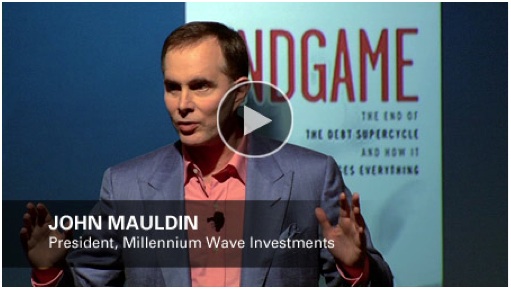
http://www.mauldincircle.com/index.php/
An Economy at Stall Speed
There is no way to spin the GDP report that came out this morning as anything but very bad. It was just last May that the consensus was that second-quarter GDP would be 3.3%. That had been revised down to 2.7%, but the number came in at 1.3%. Normally, at this time in a recovery we are growing at close to 3 times that number, or 3.6%. (You can read the press release and see the data I write about at http://www.bea.gov/newsreleases/national/gdp/gdpnewsrelease.htm.)
Even worse, the first-quarter number was revised down from 1.9% to an anemic 0.36%. For new readers, note that the first estimate of a quarter's growth is just that, an estimate. There are three monthly revisions that follow, and after a few years it is revised yet again with the aid of hindsight. And the 4th quarter of 2010 was taken down from 3.1% to 2.35%!
If you are looking for something (anything) that can explain the new number, then you could attribute a small portion to the effects from the Japan earthquake and tsunami, as "durable goods" from motor vehicles and parts reduced GDP by about .2%.
And it gets worse. It seems that BEA went back and revised the numbers for the recession. Would it surprise you to learn that the recession was worse than we thought at the time? The peak-to-trough decline was 5.1% instead of 4.1%. That means that in real terms the economy has not yet recovered back to the pre-recession levels. David Rosenberg notes that in his research "going back to 1947 and never before have we seen this dynamic of the level of overall economic activity lower on the second birthday of the recovery than it was at the prior cycle peak. Typically two years into a recovery, real GDP is already 9.5% above the pre-recession high."
Look at this chart from the St. Louis Fed. It is real Gross Domestic Product going back five years. This is just ugly. More on this later, as I made this point with the Senators (I wish I'd had this data when I was there!)
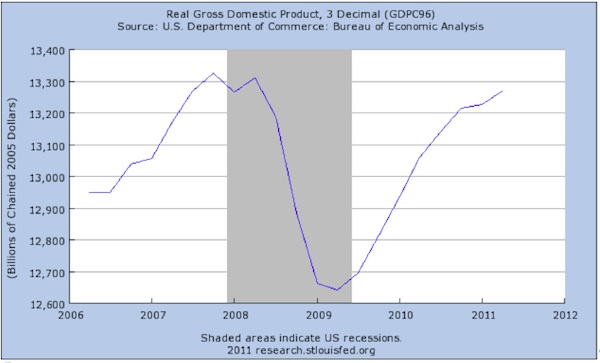
Now, notice the direction of the revisions. Care to wager the over/under on where the revisions will go when the second quarter is revised? Dare we say it could go negative? Say it ain't so, Joe!
I don't have time to cover it this week, but global growth is slowing. China's PMI came in at 48.9 in July. Korean exports are slowing.
Joan McCullough notes:
"Working from Q309, forward, read GDP as follows:
"1.7, 3.8, 3.9, 3.8, 2.5, 2.3 ... now here it comes: 0.4 ... and then today's 1.3%.
"I won't keep you in suspense any more. Here's my take: MOMENTUM IS BROKEN. A big, ol' monkey wrench, courtesy of input arising from the change in inventory and Imports. And once momentum stumbles, then H2 growth becomes a wild card, right?"
Is There a Recession in Our Future?
I mentioned a chart from Rich Yamarone, Chief Economist at Bloomberg (who I'm having dinner with next Tuesday in NYC). I previously wrote:
"And the last chart is one I had not seen before, and is interesting. Rich notes that if year-over-year GDP growth dips below 2%, a recession always follows. It is now at 2.3%."
Growth is clearly decelerating. Look at the growth numbers from the St. Louis Fed website for the last six quarters:
2009-10-01 13019.012 2010-01-01 13138.832 2010-04-01 13194.862 2010-07-01 13278.515 2010-10-01 13380.651 2011-01-01 13444.301
It will be very interesting to see, at the end of the month, what the numbers are for the second quarter. Another quarter like the first quarter and we should either be close to or actually dip below 2%.
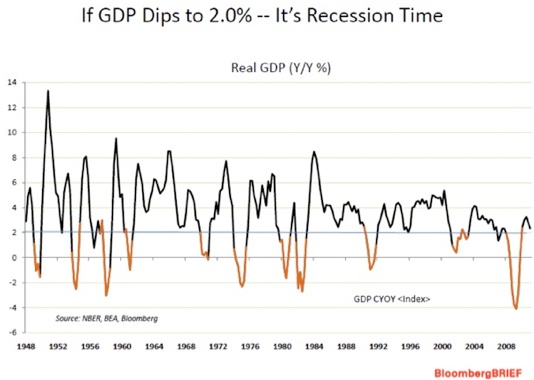
Oops. Today David Rosenberg updated that chart. This from Rosie:
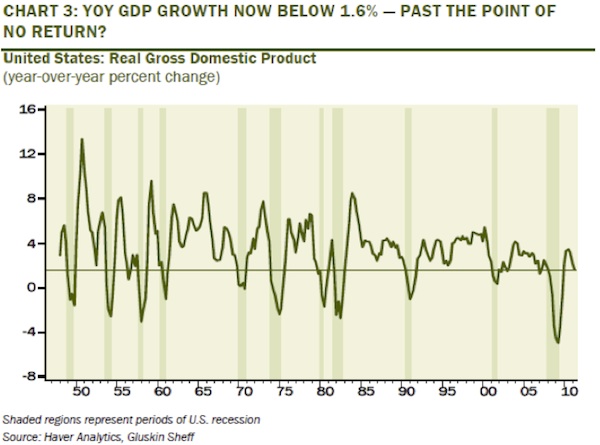
If Rich is right, then the next revisions will be down. And the growth in the second half is not going to be all that good for jobs and consumer spending.
And this from Rosie as well:
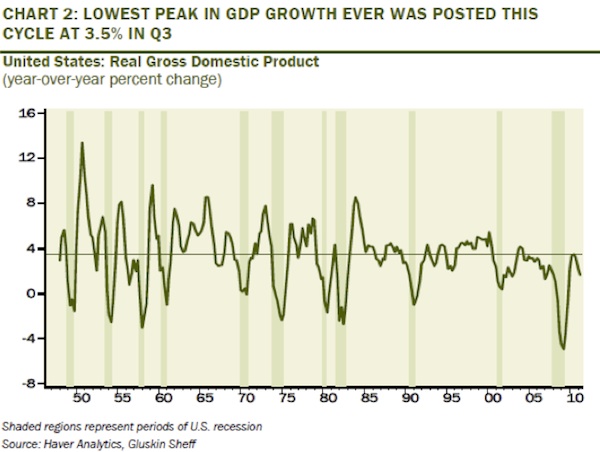
The economy is at stall speed, it is quite possible we'll see further downward revisions to the already anemic growth numbers, and Congress and the President are dithering over the debt ceiling. It will not take much to push us into an outright recession. We can go a few days, I think, with the latter problem, but not too long or the markets will throw up.
I should note that the Congressmen and Senators I met with were a very wired-in bunch. Many of them are in the leadership. And they had no clue as to how the debt-ceiling snafu would play out. Lots of speculation, but no real idea. And they were worried.
But enough on the GDP. Suffice it to say that the stock market drops about 40% on average in a recession. Just sayin'.
What I Told the Senators
It started when a friend gave Senator Dan Coats a copy of Endgame. He read it and underlined, highlighted, and scored it. The Senator Rob Portman took it off his hands and read it. They asked me to come to DC and meet a few Senators. You don't say no to such a request, but the only free day I had was Monday. I met with nine of them for about 90 minutes and Senator Cornyn (from Texas) privately beforehand for an hour. I offered him a copy of the book, but he said he was already reading it on the iPad he was carrying. I gave him one anyway. ;-)
I met with several chiefs of staff before the meeting, and they decided I should not use the typical PowerPoint approach but just talk, and gave me advice on how to go about it. Evidently, Coats and Portman had worked the room, because nine guys showed up more or less on time. Two Democrats, six Republicans, and an independent (Lieberman). Jon Kyl was there, as well as Gang of Six member, Tom Coburn from Oklahoma. Also Corker, Lugar, Coats, Portman, and Mike Lee, the "Tea Party" senator from Utah, who took the most notes. But there were a lot of them taking notes. And asking questions, some rather pointed. Overall, I was very impressed with the level of knowledge in the room and the candor.
I started by explaining what I meant by the debt supercycle and how deleveraging recessions are fundamentally different from business-cycle recessions, which is why we are not seeing a normal recovery. And it is happening all over the developed world. I think I surprised them by jumping to Europe first, noting that Europe appeared to be imploding even as we were meeting. I made the point that we could see a banking and credit crisis coming from Europe that might be worse than the subprime crisis. I noted that it was not just Greece, Ireland, and Portugal. Spain and Italy have their own share of problems, and the markets have taken their interest rates up by 1% in just the last month, just as a large rollover of debt is coming due.
We'd better stay with this Europe thing for a few minutes. A few weeks back, I talked about Italy and said I thought their debt was longer-duration, and so they might not go critical quite so fast. I got this note from London partner Niels Jensen, pointing out to me how wrong I was:
"Wrong! Italy average debt duration is in fact quite short, as illustrated in the chart below. Within Europe, only the UK has really long average debt duration (about 13 years). Most countries are averaging 5-7 years. Italy is no exception. Best, Niels."
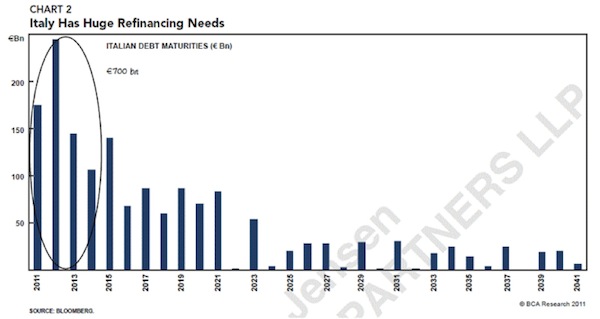
Then today I get this note from Bluemont Capital Advisors, written by Harald Malmgren, Global Economic Strategist, and Mark Stys, Chief Investment Officer. It is short but important, so I am going to quote it in full. Thanks, guys.
Escalating Eurozone Interbank Liquidity Crisis: Dollar-Euro Impact?
"Italian and Spanish interbank lending is freezing up. French Finance Ministry officials and banks have been in emergency meetings this week regarding Eurozone interbank market stress. IMF and EU officials are warning that France might also face downgrade if greater spending cuts are not made. Finance Ministry staff have been warned to be available 24/7 (irrespective of sacred August holidays!) as contagion may soon affect French banks and sovereign debt.
"In spite of last week's Eurozone Summit agreement on Greece and EFSF ‘flexibility', Italian and Spanish sovereign debt yields have resumed escalation this week. Moreover, the Italians had to cancel issuance of longer maturity debt as demand was insufficient. German Finance Minister Schauble damaged confidence Wednesday when he said the EFSF would not have a blank check to purchase Eurozone sovereign debt in the secondary market.
"Eurozone banks' primary holding of capital is in the form of Eurozone sovereign debt. It is obvious that the EFSF is not large enough to handle crises on the scale of Italian and Spanish sovereign debt. Schauble's statement is interpreted as indicating precarious support within the German parliament for the recent Summit package for Greece and the EFSF, and that an increase in EFSF is unlikely. (Schauble is personally powerful within the CDU, so his statements most likely carry more political weight than Merkel's at present.)
"Meanwhile, US money market funds have been withdrawing from Eurozone bank commercial paper, leaving Eurozone banks with a big gap in availability of short-term funding and a severe shortage of dollars.
"In the background, the Fed has quietly advised the ECB and some other central banks that Congress has warned the Fed not to repeat the huge liquidity support to Europe and Asia that it provided in 2008. European officials believe the Fed would be less able to come to the rescue again with increased swap lines and direct loans to Eurozone banks, as it did post-Lehman.
"Thus, in parallel with the US debt ceiling uncertainties, the Eurozone appears to be entering into renewed crisis of breakdown in interbank trust and escalating borrowing costs for Italy and Spain, and maybe even France. Whatever happens with the US debt ceiling, attention will soon turn back to Eurozone sovereign debt problems and threats to the viability of Eurozone banks from debt contagion.
"It is increasingly possible that the ECB may not be able to function as lender of last resort on the scale required to cope with an interbank lending breakdown. It is also thus likely that the Eurozone will suffer a shortage of dollars for its interbank credit markets. Demand for dollars will likely escalate, while confidence in Eurozone financial institutions falls. This could force Eurozone banks to purchase dollars in the open market and drive the dollar higher."
I made some similar points to the Senators about why the euro is going to parity - if it survives. Then I went into my "Japan is a bug in search of a windshield" spiel, pointing out that the yen will fall in half.
All this to say is that the bond markets are going to get spooked sooner than we are prepared for. If the US does not show up with a credible deficit-reduction program by the end of 2013, we could see interest rates rising even in the face of a deflationary recession. If we do nothing, we become Greece.
And the $4 trillion they are talking about? That is a down payment. We need $10-12 trillion in cuts over ten years, which I explained would put us into a slow-growth-at-best, Muddle Through economy with high unemployment and tough tax policies. I pointedly showed Senator Mike Lee why we could not cut spending too fast (as the Tea Party wants) - unless we want Depression 2.0 and 20% unemployment. It has to be my "glide-path" option. As I said, Lee was taking notes fast and furious. And asking the right questions. I like him. Lieberman was also engaged (I really do like him), and they were all very candid about the political problems they were facing. And it was a very sober group as we ended the meeting. But they all politely thanked me for coming and talking frankly. Even the Dems (I confess I think I know the name of one, but the website picture does not look like him, so I don't want to get it wrong. But he was impressive with his questions as well.)
I could go on, but long-time readers know by now my Endgame scenario. I got a lot of promises that the Senators would read my book. Coats and Portman got extra copies to give out on the floor.
I have to tell you, gentle reader, that leaving that meeting I was very sober as well. They made it clear that getting it done is going to be very hard, and it will take real commitment from men and women like them to get us through this. They all noted that their mail was running 100 to 1 against cutting Medicare. Every one of them. They know that they cannot close the deficit gap just with the elimination of the Bush tax cuts. And I think I convinced any who weren't already, that not getting the deficit under control means Depression 2.0 and a disaster.
The debate in 2012-13 will be, how much Medicare do we want and how do we want to pay for it? Sadly, I think the only way is with a VAT (value-added tax), since less than 50% of citizens pay any income taxes now. Want to run on a program of taxing the "middle class?" Didn't think so. Want to run on a platform of cutting Medicare? That is not a winner either. We are at an impasse.
We need a massive restructuring of our entire tax code to be more encouraging of creating jobs. But that is another story for another week. It is time to hit the send button.
Well, just one brief commercial. If Senators are reading Endgame, maybe you should be! Get it at your local bookstore or Amazon.com.
Time for Friends, Fish, and Wine
While I will be in New York for a few days next week, I first head on Thursday morning for Grand Lake Streams, Maine. I will take a float plane in from Bangor with Nouriel Roubini and my son and a few others. This is I think year 6 for me to go fishing. Bloomberg is sending a TV crew. We fish, then eat the fish we catch for lunch, drink good wine, fish some more, have a gourmet dinner, drink more wine, and talk economics. The event is organized by David Kotok of Cumberland Advisors. The list of friends is so long. John Silvia (chief econ at Wells Fargo), Martin Barnes, Barry Ritholtz, Paul McCulley, Bill Dunkelberg (chief econ at the National Federation of Independent Businesses), some Fed econ types, hedge-fund managers - and this year there will be seven ladies. About 40 people in all. Seems the limit is the number of guides we can get. My son Trey has grown up with this crowd. It is our favorite time together of the year.
NYC will be fun. Yahoo and Bloomberg. I meet with my publisher, Debra Englander from Wiley, about the next books under way. As noted, Rich Yamarone has an all-star cast lined up for dinner, and I get to be with Art Cashin. I will also get to hang out with Doug Kass and Vince Farrel. How fun. Mike West of Biotime will be at dinner Wednesday. I think he may be the most important man of our times. If anyone can figure out how to stop this aging thing, it will be him. What a great week!
And you have a great week as well. Now let me close with a great line from Doug Casey, who sat next to me on the Whiskey Bar panel at the Agora Symposium, which had the crowd in stitches. Ritholtz was on a roll, too, and some of the rest of us got in a few good lines. Great fun!
"The situation is hopeless, but it is not serious." Gentle reader, we get through this.
Your really looking forward to next week analyst,
John F. Mauldin
johnmauldin@investorsinsight.com
John Mauldin, Best-Selling author and recognized financial expert, is also editor of the free Thoughts From the Frontline that goes to over 1 million readers each week. For more information on John or his FREE weekly economic letter go to: http://www.frontlinethoughts.com/learnmore
To subscribe to John Mauldin's E-Letter please click here:http://www.frontlinethoughts.com/subscribe.asp
Copyright 2011 John Mauldin. All Rights Reserved
Note: John Mauldin is the President of Millennium Wave Advisors, LLC (MWA), which is an investment advisory firm registered with multiple states. John Mauldin is a registered representative of Millennium Wave Securities, LLC, (MWS), an FINRA registered broker-dealer. MWS is also a Commodity Pool Operator (CPO) and a Commodity Trading Advisor (CTA) registered with the CFTC, as well as an Introducing Broker (IB). Millennium Wave Investments is a dba of MWA LLC and MWS LLC. Millennium Wave Investments cooperates in the consulting on and marketing of private investment offerings with other independent firms such as Altegris Investments; Absolute Return Partners, LLP; Plexus Asset Management; Fynn Capital; and Nicola Wealth Management. Funds recommended by Mauldin may pay a portion of their fees to these independent firms, who will share 1/3 of those fees with MWS and thus with Mauldin. Any views expressed herein are provided for information purposes only and should not be construed in any way as an offer, an endorsement, or inducement to invest with any CTA, fund, or program mentioned here or elsewhere. Before seeking any advisor's services or making an investment in a fund, investors must read and examine thoroughly the respective disclosure document or offering memorandum. Since these firms and Mauldin receive fees from the funds they recommend/market, they only recommend/market products with which they have been able to negotiate fee arrangements.
Opinions expressed in these reports may change without prior notice. John Mauldin and/or the staffs at Millennium Wave Advisors, LLC and InvestorsInsight Publishing, Inc. ("InvestorsInsight") may or may not have investments in any funds cited above.
Disclaimer PAST RESULTS ARE NOT INDICATIVE OF FUTURE RESULTS. THERE IS RISK OF LOSS AS WELL AS THE OPPORTUNITY FOR GAIN WHEN INVESTING IN MANAGED FUNDS. WHEN CONSIDERING ALTERNATIVE INVESTMENTS, INCLUDING HEDGE FUNDS, YOU SHOULD CONSIDER VARIOUS RISKS INCLUDING THE FACT THAT SOME PRODUCTS: OFTEN ENGAGE IN LEVERAGING AND OTHER SPECULATIVE INVESTMENT PRACTICES THAT MAY INCREASE THE RISK OF INVESTMENT LOSS, CAN BE ILLIQUID, ARE NOT REQUIRED TO PROVIDE PERIODIC PRICING OR VALUATION INFORMATION TO INVESTORS, MAY INVOLVE COMPLEX TAX STRUCTURES AND DELAYS IN DISTRIBUTING IMPORTANT TAX INFORMATION, ARE NOT SUBJECT TO THE SAME REGULATORY REQUIREMENTS AS MUTUAL FUNDS, OFTEN CHARGE HIGH FEES, AND IN MANY CASES THE UNDERLYING INVESTMENTS ARE NOT TRANSPARENT AND ARE KNOWN ONLY TO THE INVESTMENT MANAGER.
John Mauldin Archive |
© 2005-2022 http://www.MarketOracle.co.uk - The Market Oracle is a FREE Daily Financial Markets Analysis & Forecasting online publication.



